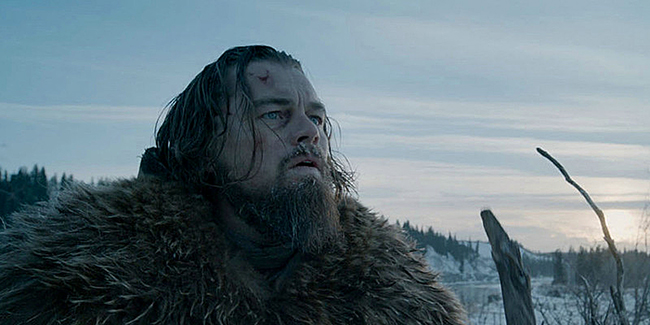With the Academy Awards fast approaching, contemporary film knowledge is now more than ever a useful asset. Films such as “Spotlight” and “The Revenant” are sure to win their fair share of awards, and yes, Leonardo DiCaprio might finally win his first Oscar. Here is a list of 10 movies you should know before the ceremony on Feb. 28.
"The Revenant"
Revenge is served cold in this wintry adventure epic. When fur trapper Hugh Glass (Leonardo DiCaprio) is left for dead by his comrade John Fitzgerald (Tom Hardy) after a gruesome bear attack, Glass sets out on a hunt for his betrayer. DiCaprio carries the film with a stellar, raw performance as he endures real-life tribulations to enhance the picture’s intensity, leaping into a frozen river and chowing down on raw bison liver during the arduous shoot. Throughout the film, Emmanuel Lubezki’s masterful cinematography, which only uses natural lighting, never ceases to inspire awe. “The Revenant” offers many gruesome moments that viewers will find difficult to watch, but thanks to director Alejandro G. Iñárritu’s skillful direction, they’ll also find it hard to turn away.
"Mad Max: Fury Road"
Director George Miller’s “Mad Max: Fury Road” assaults the eyes and ears with his imaginative rendition of the post-apocalyptic wasteland. Brutal, vibrant and kinetic, the fourth entry in the “Mad Max” series revitalizes the franchise and propels it in an exciting new direction. Tom Hardy successfully takes over for Mel Gibson as Max Rockatansky, but the real hero of the picture is Charlize Theron’s Imperator Furiosa, a warrior desperate to rescue sex slaves from the tyrannical Immortan Joe (Hugh Keays-Byrne). “Fury Road” is part thrilling action movie, part parable of redemption discovery and part exploration of female strength in the face of oppression.
"Anomalisa"
“Anomalisa” is a touching collaboration between directors Charlie Kaufman and Duke Johnson. Using lifelike puppets and incredible stop-motion animation, the film spends one night with Michael Stone (David Thewlis), a depressed writer and speaker on customer service who has trouble establishing human connections. Then, during his stay at a hotel, he meets Lisa (Jennifer Jason Leigh), a lovely woman who stands apart from the crowd and ignites Michael’s passion. “Anomalisa” captures the tragic nature of loneliness and the yearning to escape it. The film’s very human voice acting renders its tale
startlingly real.
"Room"
In “Room,” Joy Newsome (Brie Larson) and her five-year-old son Jack (Jacob Tremblay) have been held captive in a room by a rapist for years. When Joy and Jack escape their captor, the former reenters a society that has moved on without her, and the latter experiences the world for the first time. Larson and Tremblay deliver layered, moving turns as mother and son who find themselves doubtful of their ability to live beyond the room. “Room” paints a compelling portrait of victims overcoming abuse and finding strength through their love for each other.
"Spotlight"
Low-key, fact-based filmmaking at its finest, “Spotlight” chronicles The Boston Globe’s 2001 investigation of a massive sex scandal in Boston’s Catholic churches. Starring an ensemble cast led by Mark Ruffalo, Michael Keaton, Rachel McAdams and Brian d’Arcy James, the picture serves as a testament to courageous journalism, portraying reporters as deliverers of justice while characterizing them as flawed human beings. Writer-director Tom McCarthy and writer Josh Singer lend sensitivity to the Church’s traumatized victims and its horrified devotees, provoking our sympathy and outrage. A film of artistic superiority and social importance, “Spotlight” is a reminder that evil can flourish underneath the noses of good people unwilling to face it.
"Steve Jobs"
Starring a captivating Michael Fassbender in the title role, the film embodies the essence of the stage with theatrical back and forth dialogue and a three-act structure that involves three separate tech launches. The film features excellent dialogue from screenwriter Aaron Sorkin ("The Social Network") and deft direction from Danny Boyle ("127 Hours"). The supporting cast is terrific as well, with Kate Winslet contributing a much-needed dosage of humanity to counteract Jobs’ stiffness. At the end of the day, this is Fassbender’s film — his larger-than-life portrayal of the tech mogul is embedded in every scene with his commanding performance overshadowing those of his fellow actors.
"Carol"
Director Todd Haynes’ ("Safe") gorgeous dream-like visuals set the tone for this somber tale of a forbidden romance between two lovers. Cate Blanchett delivers a mesmerizing performance as Carol, a woman who develops a relationship with a younger woman named Therese (Rooney Mara). The audience witnesses the progression of the couple’s attraction largely through the eyes of Mara’s Therese, whose naive nature is starkly contrasted with Carol’s age and experience. Therese knows not what to expect from their time together, only that she longs for Carol’s company. With spellbinding performances and a thought-provoking narrative, “Carol” is as elegant and powerful as the lead role itself.
"The Big Short"
Based off of Michael Lewis’s acclaimed book of the same name, “The Big Short” is a cleverly sardonic retelling of the 2008 financial crisis. Although the events portrayed only occurred a little over seven years ago, the film manages to have enormous shock value. The likeable scumball of a narrator (Ryan Gosling) periodically cuts into frame to emphasize that the seemingly ludicrous events did in fact transpire and resulted in financial ruin.
Director Adam McKay’s energetic direction is matched by two standout performances by Christian Bale and Steve Carrell, with Bale playing a reclusive genius and Carrell a ballsy loudmouth. “The Big Short” is surely the best take so far on the financial crisis, leaving the audience to realize the magnitude of what they just witnessed once the credits roll.
"Sicario"
Beginning with the pulse-pounding opening sequence, “Sicario”’s jarring imagery and brooding score instill a feeling of numbness in the viewer. Gripped by immense suspense, the audience knows something bigger is at stake other than the countless lives lost throughout the chaos that unfolds. Emily Blunt, effectively playing the vulnerable protagonist Kate Macer, doesn’t know who to trust or who is on the “good side.” Blunt’s Macer is truly out of her element, trapped in a maze of corruption and dishonesty that keeps the audience guessing and questioning. A superbly dark Benicio del Toro remains at Macer’s side, but even he is an unknown, with a past that remains up in the air. On top of the standout performances, Roger Deakins’s extraordinary cinematography invokes a feeling of isolation amid a totally foreign habitat.
"Son of Saul"
Directed by Hungarian newcomer László Nemes, “Son of Saul” tells the powerful story of a Hungarian Jew delegated to be a part of the “Sonderkommando,” or the division of Jews who were tasked with helping the Nazis dispose of the gas chamber victims. Strikingly intimate, the camera stays close to Saul (Géza Röhrig) throughout the film. The tight close-up shots often force the audience to rely on hearing what is occurring around Saul. Fueled by capable direction, superb sound editing and Röhrig’s outstanding performance, “Son of Saul” is a striking and imaginative new take on the brutality and horror of life in a
concentration camp.















